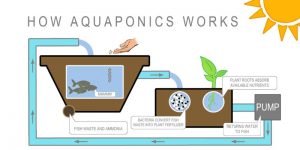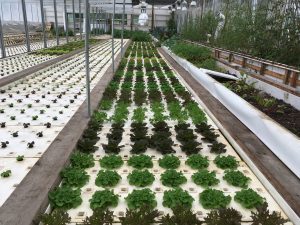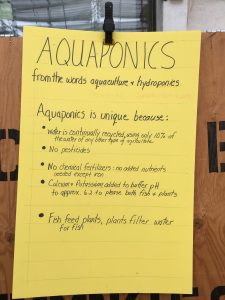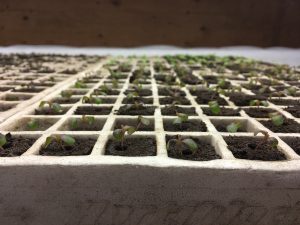If you have never heard of Aquaponics, do not fear. I just learned about this “revolutionary” form of farming at the end of summer. Put simply, aquaponics is the combination of hydroponics (the growing of plants without soil) and aquaculture (the raising of fish).
 IMAGE: https://www.google.ca/search?q=aquaponics&source=lnms&tbm=isch&sa=X&ved=0ahUKEwj5l6C_-NzWAhVD8GMKHYrRCx0Q_AUICigB&biw=1164&bih=672#imgrc=y3Vpdztu_xxncM:
IMAGE: https://www.google.ca/search?q=aquaponics&source=lnms&tbm=isch&sa=X&ved=0ahUKEwj5l6C_-NzWAhVD8GMKHYrRCx0Q_AUICigB&biw=1164&bih=672#imgrc=y3Vpdztu_xxncM:
Now don’t get me wrong, there is nothing more adorable than your Great Aunt Betty’s traditional style garden- but gardens have a number of downsides. They often require pesticides and artificial nutrients. They are prone to damage by animals and require a lot of water. 
While the goal of Aquaculture is largely to restore and protect populations of threatened and endangered aquatic species, there are a number of concerns with this production system as well. Fish waste pollutes the water with high levels of ammonia, requiring 10-20% of the tank’s water to be replaced daily. This is a massive amount of water. Additionally, the disposal of this water can often lead to the pollution of nearby streams, rivers and lakes. Not to mention, due to the close proximity of the fish, they are prone to disease and often require unnatural treatments.
 What makes Aquaponics the more sustainable option?
What makes Aquaponics the more sustainable option?
- Aquaponics continually recycles the water and uses only 10% of the amount used by any other type of agriculture.
- No pesticides or fertilizes need to be added.
- The fish feed the plants, and the plants filter the water for the fish! Talk about a symbiotic relationship.

I had the opportunity to visit an Aquaponics farm in Powell River BC in August and I was quite amazed by this system. One really cool feature of Aquaponics is the scalability. While the farm I visited was quite large, this is something that can be accomplished in a traditional sized garden, or even in a conventional sized fish tank.
A theme I have noticed within sustainable business venture success is relationship building amongst previously separate systems. Symbiotic relationships are widely necessary when it comes to sustainability, which make it key for business partnerships aimed at the long run. Although Aquaponics is a fairly straightforward example, more complicated relationships need to be developed in large scale businesses as well. What “symbiotic relationships” can you think of in big business?
Photos taken at Sunshine Coast Aquaponics, Powell River BC
Sources: https://www.theaquaponicsource.com/what-is-aquaponics/